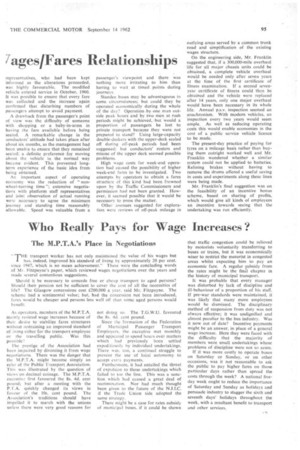Who Really Pays for Wage Increases ?
Page 97

If you've noticed an error in this article please click here to report it so we can fix it.
The M.P.T.A.'s Place in Negotiations
THE transport worker has not only maintained the value of his wages but has, indeed, improved his standard of living by approximately 20 per cent. since 1947, which is no mean achievement" These were the concluding words of Mr. Fitzpayne's paper, which reviewed wages negotiations over the years and made several contentious suggestions.
Should it be necessary to concede free or cheap transport to aged persons? Should their pension not be sufficient to cover the cost of all the necessities of life? The Glasgow concessions cost £200,000 a year. said Mr. Fitzpayne. The scheme had a sentimental value; but, had the concession not been introduced, fares would be cheaper and persons less well off than some aged persons would benefit.
As operators, members of the M.P.T.A. mainly resisted wage increases because of their desire to stabilize fares structures without restraining an improved standard of living either for the transport employee or the travelling public. Was this possible' The prestige of the Association had been impaired by divorcing it from wage negotiations. There was the danger that the M.P.T.A. might become simply an echo of the Public Transport Association. This was illustrated by the question of views on decimal coinage. The M.P.T.A. executive first favoured the 8s. 4d. cent pound; but after a meeting with the P.T.A. quickly changed its views in favour of the 10s. cent pound. The Association's traditions should have impelled it to march with the unions unless there were very good reasons for not doing so. The T.G.W.U. favoured the 8s. 4d. cent pound.
Since the formation of the Federation Of Municipal Passenger Transport Employers, the executive met . monthly and appeared to spend hours over matters which had previously been settled expeditiously by individual undertakings. There was, too, a continual Struggle to prevent the use -of local autonomy to accept extra payments.
Furthermore, it had entailed, the threat of expulsion to those undertakings which failed to toe the line. This was a sanction which had caused a great deal of recrimination. Nor had much thought been given to the future of the
if the Trade Union side. adopted the same strategy.
There might be a case for rates subsidy of municipal buses, if it could be shown that traffic congestion could be relieved by motorists voluntarily transferring to buses or trains, but it was economically wiser to restrict the motorist in congested areas whilst expecting him to pay an economic fare. A regular subsidy from the rates might be the fin3.1 chapter in the history of municipal transport.
It was probable that every manager was disturbed by lack of discipline and ill-behaviour of a proportion of his staff. If pre-war standards were maintained, it was likely that many more employees would be dismissed. The disciplinary method of suspension from duty was not always effective; it was undignified and almost peculiar to the bus industry. Was it now out of date? Incentive payments might be an answer, in place of a general wage increase. Here they were faced with the difficulty that the majority of members were small undertakings whose problems of discipline were not so acute.
If it was more costly to operate buses on Saturday or Sunday, or on other occasions, was it not reasonable to ask the public to pay higher fares on those particular days rather than spread the costs through the week? A national fiveday week ought to reduce the importance of Saturday and Sunday as holidays and persuade industry to stagger the sixth and seventh days' holidays throughout the week, with a resultant benefit to transport and other services.
















































































































































































































































